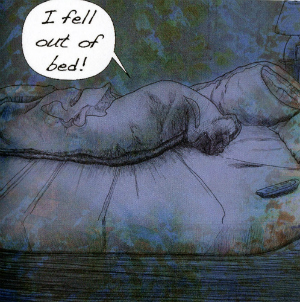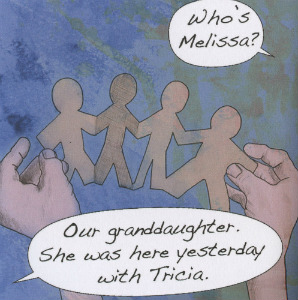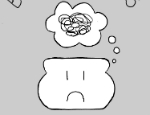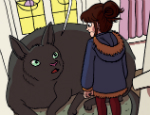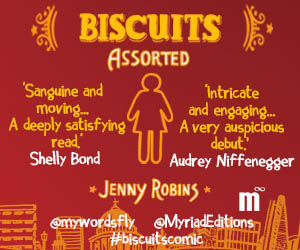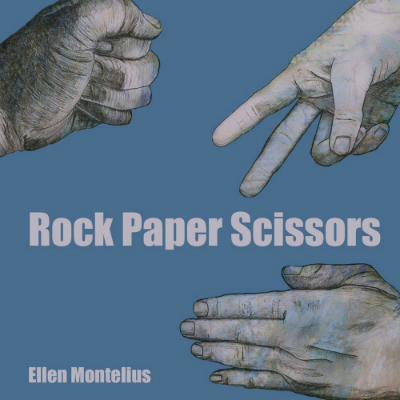 A true minicomic in terms of presentation and physicality as well as narrative lifespan, Ellen Montelius’s Rock Paper Scissors centres on Max, a housebound pensioner, as he reaches his life story’s final chapter. The book’s title comes from the childhood game of the same name which acts as a recurring intertwined motif throughout, lending thematic parallels to events as the book progresses.
A true minicomic in terms of presentation and physicality as well as narrative lifespan, Ellen Montelius’s Rock Paper Scissors centres on Max, a housebound pensioner, as he reaches his life story’s final chapter. The book’s title comes from the childhood game of the same name which acts as a recurring intertwined motif throughout, lending thematic parallels to events as the book progresses.
Max is trapped within the confines of his own small reality – the four walls of his home enclosing him, cutting him off from the outside world and leaving him with only his memories to escape into. He’s completely reliant on outside help and carers to get him through the day; his eighty-odd years ending, with inevitable, bitter irony in a cyclical return to the helplessness of a newborn baby. When Max’s condition takes a turn for the worse, the refuge of his childhood memories may provide a route away from his unhappy circumstances…
In pure visual terms Montelius creates a sombre atmosphere throughout Rock Paper Scissors with her dank, dark and muted colouring fostering a palpable sense of loneliness and incarceration. That feeling of near imprisonment is evocatively ramped up, though, by the clever device of never actually showing us the characters’ faces. It feeds into the narrative’s sense of stifling claustrophobia and ensures our empathy with Max as we, too, become desperate to escape the repressive borders of the world within each frame. There’s an almost eerie detachment to the main character’s routine that somehow simultaneously underlines the sheer humanity of the story.
As regards each individual panel that maudlin ambiance is built up with assured technique but where Montelius’s storytelling does suffer occasionally is from a clumsier transition between scenes that results from a conflicted sense of storytelling confidence. There are a couple of moments, for example, where the need to explain events with captions that the reader could easily have inferred from the visuals seems an awkward intrusion. It’s a common trap that newer creators fall into but it’s particularly at odds in work that is otherwise keen to ask the reader to piece together the fragmentary visual cues that are provided.
Nevertheless Rock Paper Scissors is a mood-filled mini-drama with a beautifully realised ending; one that may not be original in conception but is certainly effective in execution. As a tale of a life drawing to a close against the backdrop of the minutiae of the protagonist’s final days, its interweaving metaphorical elements lend it an additional emotional resonance. Montelius may still be learning her craft but this is a promising print debut.
For more on the work of Ellen Montelius visit her site here and follow her on Twitter here. You can buy copies of Rock Paper Scissors here priced £8.00.
For regular updates on all things small press follow Andy Oliver on Twitter here.





